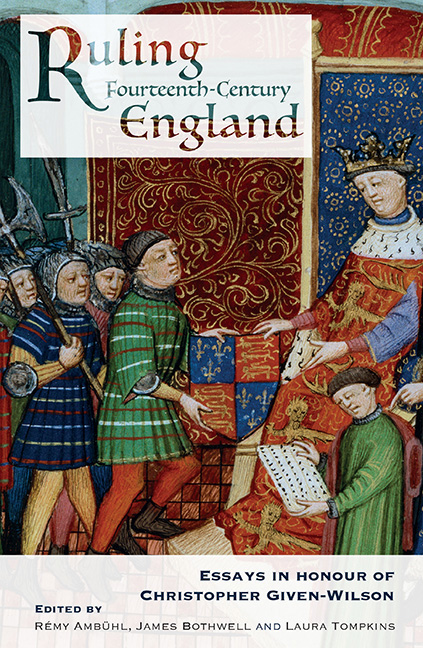Book contents
- Frontmatter
- Contents
- Contributors
- Abbreviations
- Introduction
- The Efficiency of English Royal Administration in the Last Years of Edward I
- Government and Market in the Early Fourteenth Century
- Kings' Clerks: The Essential Tools of Government
- Edward II: Favourites, Loyalty and Kingship
- The Perils of Lordship: The Life and Death of William Tuchet (c. 1275–1322)
- ‘War’, ‘Rebellion’ or ‘Perilous Times’? Political Taxonomy and the Conflict in England, 1321–2
- The Carlisle Roll of Arms and the Political Fabric of Military Service under Edward III
- What's in a Title? Comital Development, Political Pressures and Questions of Purpose in Fourteenth-Century England
- Edward the Black Prince: Lordship and Administration in the Plantagenet Empire
- ‘Said the Mistress to the Bishop’: Alice Perrers, William Wykeham and Court Networks in Fourteenth-Century England
- The Politics of Surrender: Treason, Trials and Recrimination in the 1370s
- Richard II in the Mirror of Christendom
- Bibliography
- Index
- Tabula Gratulatoria
What's in a Title? Comital Development, Political Pressures and Questions of Purpose in Fourteenth-Century England
Published online by Cambridge University Press: 18 September 2019
- Frontmatter
- Contents
- Contributors
- Abbreviations
- Introduction
- The Efficiency of English Royal Administration in the Last Years of Edward I
- Government and Market in the Early Fourteenth Century
- Kings' Clerks: The Essential Tools of Government
- Edward II: Favourites, Loyalty and Kingship
- The Perils of Lordship: The Life and Death of William Tuchet (c. 1275–1322)
- ‘War’, ‘Rebellion’ or ‘Perilous Times’? Political Taxonomy and the Conflict in England, 1321–2
- The Carlisle Roll of Arms and the Political Fabric of Military Service under Edward III
- What's in a Title? Comital Development, Political Pressures and Questions of Purpose in Fourteenth-Century England
- Edward the Black Prince: Lordship and Administration in the Plantagenet Empire
- ‘Said the Mistress to the Bishop’: Alice Perrers, William Wykeham and Court Networks in Fourteenth-Century England
- The Politics of Surrender: Treason, Trials and Recrimination in the 1370s
- Richard II in the Mirror of Christendom
- Bibliography
- Index
- Tabula Gratulatoria
Summary
By the late fourteenth century, the idea of the English earldom was well established in the collective political, social and administrative mind. By this point the title had been defined to such a degree that it would retain the same fundamental characteristics for the rest of the Middle Ages and beyond. In 1300, ideas of both earls and earldoms had been considerably less defined, and it was processes and events taking place primarily in the mid-fourteenth century, and in particular Edward III's reign, which substantially clarified the title's position within the English social and political hierarchy. This chapter will examine the earls and earldoms of Edward's reign in three sections, never before studied as a set of interconnected developments: the identity of those holding the title during Edward's reign; the processes – both external and integral to the concept of the earldom – which had an impact on the title's development; and the events which encouraged these processes. It will also consider a different way of interpreting Edward's treatment of the title. Earls were the building blocks of the medieval elite, being the oldest, lowest and most numerous titled nobles present at any given time in England. As a result, the title's increased delineation during the fourteenth century had considerable consequences for the political and social elite. Perhaps most importantly, this sharpened definition would help decide how monarchs treated the title of earl for the remainder of the Middle Ages.
Identities and family backgrounds
Edward III's earls were a surprisingly heterogeneous group. In terms of the established nobility, though including individuals from important thirteenthand in some cases twelfth-century families, many of these men started getting individual parliamentary summons as earls only in the decades before Edward's reign. Of the truly ‘old’ nobility, those dating back before the Barons’ Wars of the 1260s, there were the Bohun earls of Hereford and Essex, de Vere earls of Oxford, and Warenne earls of Surrey. The Bohuns had held the earldom of Hereford since 1200, but were nonetheless often in opposition to the existing royal administration, whether during the events of 1215 or 1258–65, the crisis of 1297, the Contrariant rising of 1321–2 or the Nottingham Coup of 1330.
- Type
- Chapter
- Information
- Ruling Fourteenth-Century EnglandEssays in Honour of Christopher Given-Wilson, pp. 163 - 184Publisher: Boydell & BrewerPrint publication year: 2019



